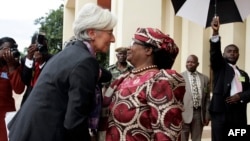BLANTYRE, MALAWI —
The International Monetary Fund has resolved to immediately disburse about $20 million in suspended funding to Malawi. The IMF imposed the suspension last October pending investigations of a scandal in which millions of dollars in public funds were looted from government coffers. Although government authorities are happy with the IMF’s change of heart, commentators warn that this does not necessarily mean all is well on the country’s economic front.
The decision to release the funds was made by the IMF at a meeting in Washington on Friday after an extended review of Malawi's finances.
IMF Deputy Managing Director and acting chair Naoyuki Shinohara said the funds were released because, “Malawi’s macroeconomic performance under the IMF-supported program has remained broadly satisfactory," and that policy reforms initiated in May of last year are showing positive results.
However, he acknowledged that the recent fraud and misappropriation of substantial amounts of public funds and the associated loss of financial aid have negatively affected the country's financial outlook.
Revelations of corruption led the country's key donors to withhold millions of dollars in budget support and to demand that the Malawi government investigate and prosecute those involved in stealing state funds.
Shinohara said that to restore confidence in the management of its economy, it will be important for the Malawi government to investigate the fraud thoroughly and address the weaknesses in public financial management exposed by the fraud.
Malawi’s finance minister, Maxwell Mkwezalamba, told a news conference in Blantyre that the release of the IMF funds will encourage other donors who have withheld aid to resume funding.
“This is a green light to our development partners to continue assisting us. And this becomes particularly important for the CABS, the Common Approach to Budgetary Support, that had decided to delay the disbursement of budget support on the account of the looting on government resources, so there is already indication that the CABS [donors] group will come forward to support Malawi,” said Mkwezalamba.
Mabvuto Bamusi, an economic and social commentator, said that despite the release of IMF funds, Malawi cannot be complacent.
“There is a lot of caution that needs to be taken, and one of the cautions is that the government at Lilongwe should avoid being overexcited and pretending that everything is back to normal because we still have scenario where the cost of living is still very high and that, cannot simply being addressed by the $20 million from the donor community,” said Bamusi.
Bamusi also said that unless the Malawi government addresses issues such as drug shortages in hospitals, dilapidated roads, and problems in the procurement of school materials, it still would be a fallacy to talk about economic normality.
He also pointed out that whether or not some of the other donors who withheld aid will release it is still uncertain; just because the IMF has done so does not guarantee anything.
Malawi is only four months away from general elections, and Bamusi thinks it likely many individual donors will take a wait and see approach.
The decision to release the funds was made by the IMF at a meeting in Washington on Friday after an extended review of Malawi's finances.
IMF Deputy Managing Director and acting chair Naoyuki Shinohara said the funds were released because, “Malawi’s macroeconomic performance under the IMF-supported program has remained broadly satisfactory," and that policy reforms initiated in May of last year are showing positive results.
However, he acknowledged that the recent fraud and misappropriation of substantial amounts of public funds and the associated loss of financial aid have negatively affected the country's financial outlook.
Revelations of corruption led the country's key donors to withhold millions of dollars in budget support and to demand that the Malawi government investigate and prosecute those involved in stealing state funds.
Shinohara said that to restore confidence in the management of its economy, it will be important for the Malawi government to investigate the fraud thoroughly and address the weaknesses in public financial management exposed by the fraud.
Malawi’s finance minister, Maxwell Mkwezalamba, told a news conference in Blantyre that the release of the IMF funds will encourage other donors who have withheld aid to resume funding.
“This is a green light to our development partners to continue assisting us. And this becomes particularly important for the CABS, the Common Approach to Budgetary Support, that had decided to delay the disbursement of budget support on the account of the looting on government resources, so there is already indication that the CABS [donors] group will come forward to support Malawi,” said Mkwezalamba.
Mabvuto Bamusi, an economic and social commentator, said that despite the release of IMF funds, Malawi cannot be complacent.
“There is a lot of caution that needs to be taken, and one of the cautions is that the government at Lilongwe should avoid being overexcited and pretending that everything is back to normal because we still have scenario where the cost of living is still very high and that, cannot simply being addressed by the $20 million from the donor community,” said Bamusi.
Bamusi also said that unless the Malawi government addresses issues such as drug shortages in hospitals, dilapidated roads, and problems in the procurement of school materials, it still would be a fallacy to talk about economic normality.
He also pointed out that whether or not some of the other donors who withheld aid will release it is still uncertain; just because the IMF has done so does not guarantee anything.
Malawi is only four months away from general elections, and Bamusi thinks it likely many individual donors will take a wait and see approach.
